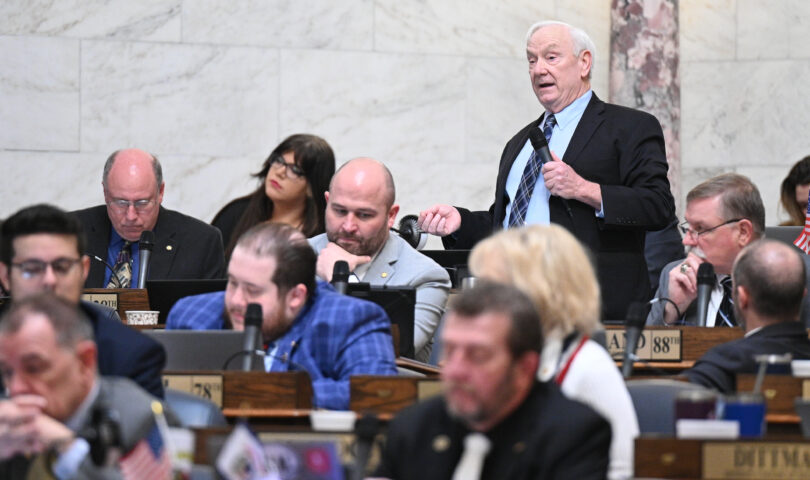MORGANTOWN – Between long and frequent recesses on Saturday, the last day of the legislative session, the House and Senate managed to complete work on some bills and send them on their way to the governor’s office.
And, late in the day, both sides finally began passing bills on third reading. Among them, the House of Delegates passed and sent back to the Senate what has been called the Intelligent Design bill, though it doesn’t mention ID anymore.
SB 280 left the House saying, “No public school board, school superintendent, or school principal may prohibit a public school classroom teacher from responding to student inquiries or answering questions from students about scientific theories of how the universe and/or life came to exist.”
There was some Q&A on the bill. Delegate Evan Hansen, D-Monongalia, asked Judiciary chair Tom Fast, R-Fayett, if the bill applied only to scientific theories. Fast replied, “Scientific theories are often decided on the elements of probabilities. … So it could.”
Hansen objected to the bill because he views it as supporting particular religious beliefs over scientific theory that have evidence and data and can be repeated experimentally.
Delegate Joey Garcia, D-Marion, said the bill lacks guardrails for what a teacher can say. “Any beliefs to indoctrinate children could be put out there. … There are so many things that could be done without any ability to stop a teacher form saying things to impressionable youth.”
Delegate Brandon Steele, R-Raleigh, defended the bill. “I believe in a God that created the universe. … The more that science discovers about our natural world … the closer we get to realizing the old sources are being confirmed over and over and over again. “
That discussion, those questions, shouldn’t be suppressed, he said. “Whatever is in that science book, they should be able to pose the question.”
And Delegate David Kelly, R-Tyler, pointed out that the bill is permissive. “A teacher may answer the question, or not.”
At this point, the House was only to bills into its day’s calendar, with less than four hours left before midnight. So Delegate Adam Vance, R-Wyoming, called the question, which was approved in a 77-23 vote.
Then the bill passed 89-9 and was sent back to the Senate for concurrence on the House amendments.
Other bill action
The final gavel came down at midnight. Here are some highlights of bills sent to the governor’s way by deadline.
HB 4911 is the raw milk bill. On Friday, Sen. Ryan Weld, R-Brooke, called it the “Listeria Comeback Tour Act.” But Sen. Patricia Rucker, said should be called the “Dave Sypolt Act” because Sypolt, R-Preston, tried for years to get it passed.
Current law requires herd sharing – owning a share in a cow in order to legally obtain raw milk. The bill allows sale if it is labeled “unpasteurized raw milk” and warns: “Consuming unpasteurized raw milk may increase your risk of foodborne illness, especially for children, elderly, immunocompromised individuals, and persons with certain medical conditions.”
The Senate removed from the bill a clause providing immunity from liability.
HB 5014 appropriates $2 million for WVU’s Rockefeller Neuroscience Institute to help fund its focused ultrasound clinical trial to treat obesity and PTSD in veterans. This project is planned to start in April. The bill also dedicates $4 million to the Hospital Grants and Research Programs line item to support research at other hospitals.
HB 4945 updates some provisions of the Hope Scholarship program. Among them, Hope funding will be based on the estimated number of Hope students for the coming year, rather than the prior year, in order to avoid chronic underfunding.
It also allows microschools, learning pods and individualized instructional programs implemented under the Hope Scholarship Act to issue diplomas.
HB 4350 changes how candidate vacancies are filled if no one from a political party files to run in a partisan primary for office. Current law says the party may appoint someone to fill the candidacy vacancy up to three weeks after the close of filing.
The bill says the party executive committee may fill the vacancy no later than the third Tuesday following the close of the filing period. If the executive committee fails to make an appointment within the time required, the chairperson of the executive committee may make the appointment not later than two days following the deadline for the executive committee.
If a vacancy in nomination will be caused by the failure of a candidate to file for an office, or by withdrawal of a candidate, the vacancy may not be filled.
HB 5349 is called the Truth in Food Labeling Act. It requires labeling of “analogue” food products derived from plants, insects or fungus and other additives, and “cell-cultured” food grown in a lab.
SB 683 removes hydrogen from the list of alternative fuels subject to the motor fuel excise tax until July 1, 2034.
HB 4552 requires a candidate for partisan political office to be a member of the party for which they’re seeking nomination or election. It would take effect Jan. 1, 2025.
SB 164 deals with trespassing and adds a restitution penalty to existing trespassing code. It calls for restitution equal to twice the value of any damage or waste caused by the trespassing, and provides for a diversion plan and expungement of the offense if the restitution is paid within six months.
Email: dbeard@dominionpost.com




